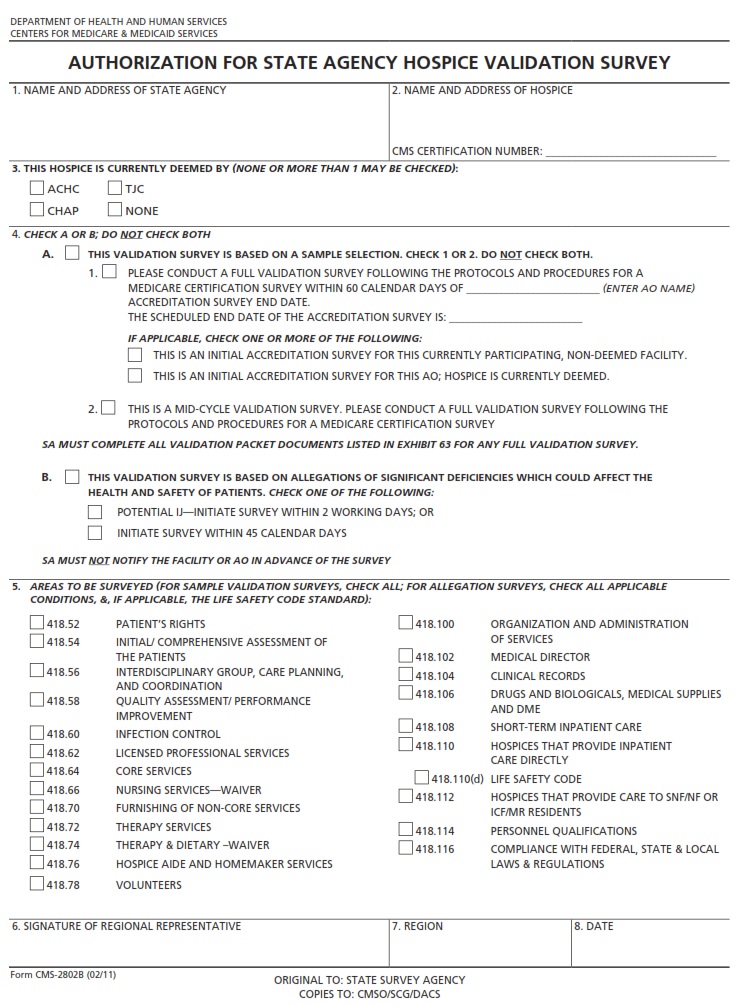CMSFORM.ORG – CMS 2802B – REQUEST FOR VALIDATION OF ACCREDITATION SURVEY FOR HOSPICE – In the intricate world of healthcare, ensuring the quality and efficacy of hospice services is paramount. The CMS 2802B form, known as the Request for Validation of Accreditation Survey for Hospice, serves as a crucial instrument in this pursuit of excellence. Imagine a journey through the inner workings of hospice care accreditation – where meticulous assessments and stringent standards converge to shape the future of end-of-life support. This article delves into the significance of CMS 2802B, unraveling its role in upholding standards, fostering transparency, and ultimately enhancing the delivery of compassionate care to those in their most vulnerable moments. As we embark on this exploration together, prepare to gain insights that illuminate the vital intersection between regulation and compassion in hospice services.
Download CMS 2802B – REQUEST FOR VALIDATION OF ACCREDITATION SURVEY FOR HOSPICE
| Form Number | CMS 2802B |
| Form Title | REQUEST FOR VALIDATION OF ACCREDITATION SURVEY FOR HOSPICE |
| Published | 2011-02-01 |
| O.M.B.= | |
| File Size | 110 KB |
CMS 2802B - REQUEST FOR VALIDATION OF ACCREDITATION SURVEY FOR HOSPICE (1959 downloads )
What is a CMS 2802B?
CMS 2802B, also known as the Request for Validation of Accreditation Survey for Hospice, serves as a crucial document in the healthcare industry. This form plays a vital role in ensuring that hospice facilities meet necessary standards and regulations set forth by the Centers for Medicare & Medicaid Services (CMS). It provides a way for hospices to validate their accreditation surveys and demonstrate compliance with quality measures and patient care guidelines.
By completing the CMS 2802B form accurately and timely, hospices can showcase their commitment to delivering high-quality end-of-life care to patients. This process not only helps maintain transparency and accountability within the healthcare sector but also fosters continuous improvement in service delivery. Ultimately, adherence to CMS regulations through initiatives like the CMS 2802B contributes to enhancing overall patient outcomes and satisfaction levels within hospice care settings.
Where Can I Find a CMS 2802B?
If you’re in the market for a CMS 2802B form, you might be wondering where to find one. The first place to check would be directly with the Centers for Medicare & Medicaid Services (CMS) website, where they typically offer downloadable versions of their forms. Additionally, your local hospice agency or healthcare provider may have access to these forms and can provide you with a copy upon request.
Another avenue to explore is reaching out to accreditation organizations that work closely with hospices. These organizations often assist hospice agencies with compliance and accreditation processes and may have the CMS 2802B form readily available. Keep in mind that staying informed about updates and changes in regulations regarding hospice care can help you stay up-to-date on the latest documentation requirements, including the CMS 2802B form.
CMS 2802B – REQUEST FOR VALIDATION OF ACCREDITATION SURVEY FOR HOSPICE
The CMS 2802B – Request for Validation of Accreditation Survey for Hospice is a critical tool in ensuring the quality and standardization of hospice care services. By seeking accreditation validation through this survey, hospices demonstrate their commitment to meeting rigorous standards set forth by regulatory bodies. This process not only helps to uphold the credibility and reputation of hospice organizations but also ensures that patients receive high-quality and compassionate end-of-life care.
Accreditation surveys play a vital role in driving continuous improvement within the hospice industry. Through assessing various aspects of care delivery, such as patient outcomes, compliance with regulations, and staff training, these surveys enable hospices to identify areas for enhancement and implement best practices. By actively engaging in the validation process outlined in CMS 2802B, hospices can showcase their dedication to providing exceptional care while also fostering a culture of accountability and transparency within their organization.
